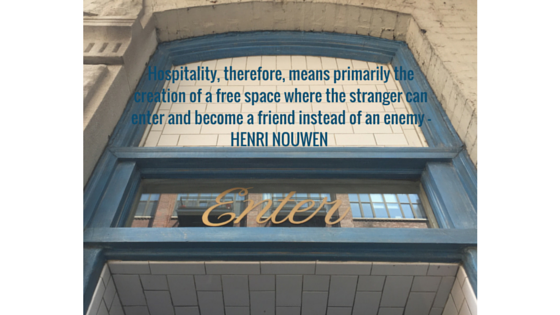
Unconditional Acceptance
It is hard to overstate the impact that a genuinely warm welcome can have in a person’s life. Welcoming someone bridges them from being a vulnerable outsider to being connected in relationship. When you accept and include someone, you lay the initial groundwork for a relationship to thrive and grow. Conversely, by not welcoming someone, you shut down a person’s interest or willingness to engage relationally. Welcoming provides a safe environment where wrestling with matters of faith for more than just one quick conversation is acceptable, and dealing with the hardships of life without being judged is allowed. It is what everyone desperately needs as they make their way toward faith.
Although it might be a part of it, welcoming is not the same as entertaining in your home. It’s opening your heart and creating a safe place of love and acceptance wherever you may be. One of the most practical ways to step into another person’s world and to make him or her feel comfortable enough to step into yours is to simply offer the gift of attentiveness.
In our “two screen” culture, giving your attention to only one thing at a time is rare; we’ve allowed multitasking to become normal. But people don’t feel welcomed if we are checking our mobile device, allowing our minds to wander, or even just thinking about what we’re going to say next. And the opposite is also true: If we stop what we’re doing to listen and give our full attention, they will feel welcomed by us. When you set aside your agenda to focus on someone, you communicate that you value them and that you’re glad to spend time with them.
Even a casual reading of the Gospels shows how often Jesus gave individuals His full attention. For example, in John 4 we read the story of Jesus meeting with the Samaritan woman who came to the well to draw water. Although Jesus was the visitor in the Samaritan woman’s neighborhood, we see him deliberately creating a safe environment for spiritual conversation through His attentiveness.
Welcoming is simply the act of showing unconditional acceptance to people without any expectations of reciprocation. When you welcome people into your life and activities, you are physically reflecting Christ’s love and acceptance. When people experience the warmth of your welcome, they are drawn to it, as they would be to a light in the darkness or a fire on a chilly night. When they have a taste, like a sample of savory food, they want more. This is an action that speaks to any culture and across any language, race, or religious divide. In this way, we are following Jesus’ instruction in Matthew 5 to be light and salt to people we know.
How about you? Have you ever had someone in your life who made you feel welcome no matter where you were? Following this practice of Jesus is especially valuable for creating a safe place to allow someone to be themselves, and ask questions about matters of faith.
John Crilly
National Field Director

this is so lovely. i’ve experienced it with my old neighbor who lived just five doors down from my house. she always made me feel welcome.